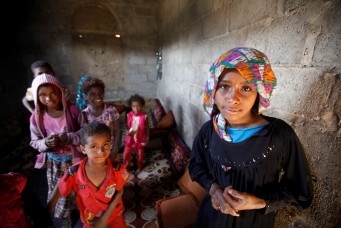A Call to Action for Law and Human Decency in Yemen
The top United Nations human rights official has called for the establishment of an independent body to carry out comprehensive investigations of human rights violations in Yemen.
Can anything be done to slow down the recurring atrocities and endless human suffering that have turned the Arab core of the Middle East into a veritable torture chamber? The gravity, frequency, and scale of the gruesome practices of governments, opposition and terror groups, and foreign armies alike have become so routine that they often fail even to get mentioned in the international press—let alone addressed by the global political forums that are supposed to prevent and punish war crimes and crimes against humanity.
A possible sign of change appeared this week in the call Thursday by the top United Nations human rights official for the international community to establish an independent body to carry out comprehensive investigations of human rights violations in Yemen. The call by UN High Commissioner for Human Rights Zeid Ra’ad Al Hussein follows the release Thursday by the UN Human Rights Office of a new report (requested by the UN Human Rights Council) that lists serious allegations of violations and abuses committed by all sides to the conflict in Yemen.
The report highlights the war’s impact on civilian lives, health and infrastructure, noting that in 2015-2016 some 3,799 civilians were killed and 6,711 injured. The scale of the war’s impact is often so huge—as it is also in Syria—that it defies our ability to understand where to begin to do something about it. In Yemen, at least 7.6 million people, including three million women and children, suffer from malnutrition; another three million people have been uprooted from their homes.
The numbers in Iraq and Syria are much worse in magnitude, with hundreds of thousands dead due to the deliberate war policies by Arab governments and their local and foreign foes. In the past two weeks alone we have had official and credible reports by assorted international organizations that speak of tens of thousands of Syrians killed in government jails, 18 different starvation sieges on civilians in Syria, attacks against hospitals and other non-combatants in Yemen, and the use of chemical weapons in Syria by the government and its opponents alike.
Documented criminal acts by all sides in Yemen include attacks on residential areas, marketplaces, medical and educational facilities, and public and private infrastructure; the use of landmines and cluster bombs; sniper attacks against civilians; deprivation of liberty; targeted killings; the recruitment and use of children in hostilities; and forced evictions and displacement.
We all agree with the UN Human Rights Office report that the devastating perpetuation of the conflict and its consequences on the population in Yemen mean that, “The international community…has a legal and moral duty to take urgent steps to alleviate the appalling levels of human despair.”
Why, though, has nothing been done for decades about atrocities mostly committed by Arab government and private criminals against their own fellow citizens? Can the world act now to slow down the reality of atrocity and impunity in the Arab World as standard operating procedures?
The call for an independent international body to investigate human rights violations and possible war crimes would be a powerful first step in that direction. The problem is that such a body will never be created by the same governments that are actively involved in the fighting in wars across our region, whether local governments like Syria, Iran, Yemen, Turkey, and Saudi Arabia, or world powers like the United States, UK, Russia, and France.
National commissions of enquiry never get very far, because they are not seriously interested in finding the truth, or they cannot operate in all parts of the country. We see this in Yemen today, and have long witnessed this pattern of state-sanctioned atrocities in Israel’s savage attacks against Palestinian civilians.
UN High Commissioner for Human Rights Zeid Ra’ad Al Hussein noted the critical need for accountability and justice that would end the current situation where those who repeatedly abuse civilians enjoy impunity. This seems like the right moment for those many courageous local, regional, and global human rights organizations to get together and explore establishing an independent investigative body that would be supported by those few governments in the world—Norway, Switzerland, New Zealand, Canada, Sweden, Denmark, and others—that genuinely care about enforcing existing human rights and international humanitarian law protections of civilians.
This week’s coordinated actions by the UN High Commissioner for Human Rights, the UN Human Rights Office, and the UN Human Rights Council to act to stop the violations and abuses committed by all sides in Yemen offer a potentially powerful opening for interested non-governmental groups as well as some honorable governments to step up quickly and support this call, and translate it into action. Movement on the Yemen war alone could be a realistic first step for an international investigation on alleged war crimes that would be independent, multinational, and credible—and fearless in investigating powerful and wealthy governments in the Arab World and abroad that have long enjoyed impunity in turning Arab lives into hell.
Rami G. Khouri is published twice weekly in the Daily Star. He was founding director and now senior policy fellow of the Issam Fares Institute for Public Policy and International Affairs at the American University of Beirut. Follow him on Twitter @ramikhouri.
Copyright ©2016 Rami G. Khouri — distributed by Agence Global



